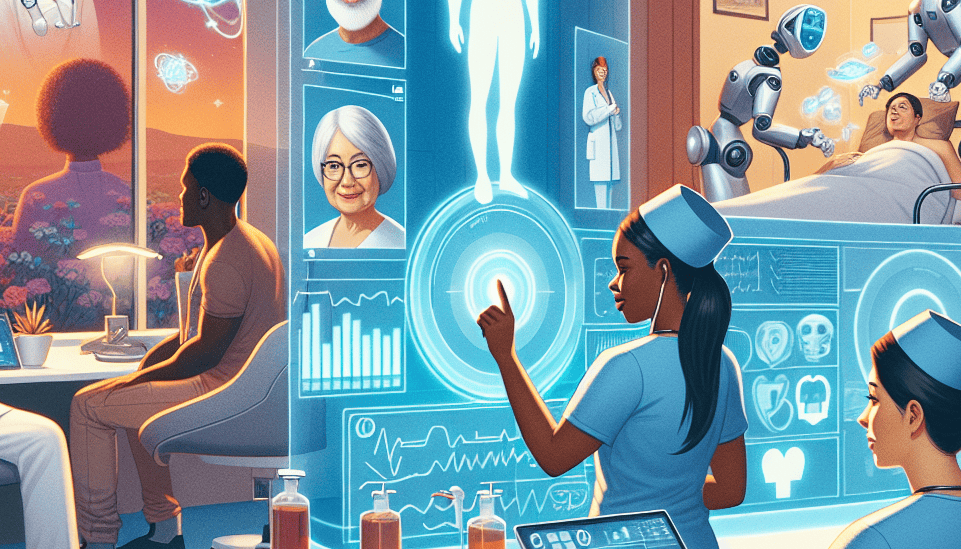The nursing profession is experiencing a rapid transformation, driven by the rise of nursing technologies that are revolutionizing how nurses deliver care. These innovations are not only enhancing patient outcomes but also empowering nurses with new tools and insights, ultimately leading to a more efficient, effective, and rewarding healthcare system.
Here are three key trends in nursing technologies that are changing the landscape of healthcare:
1. Telehealth: Bridging the Gap and Expanding Access
Telehealth, the delivery of healthcare services through telecommunications technology, has exploded in recent years, especially during the COVID-19 pandemic. This trend is transforming nursing technologies and bringing healthcare directly to patients’ homes, eliminating geographical barriers and increasing accessibility.
For nurses, telehealth offers a range of exciting possibilities:
- Remote Patient Monitoring: Nurses can monitor patients’ vital signs, medication adherence, and symptoms remotely, allowing for early intervention and prevention of complications. This is particularly crucial for managing chronic conditions and enabling patients to stay at home longer.
- Virtual Consultations: Telehealth allows for virtual consultations with patients, saving them time and expense of traveling to clinics. This is particularly valuable for patients in rural areas or with mobility limitations.
- Virtual Care Coordination: Nurses can utilize telehealth to coordinate care with other healthcare professionals, ensuring seamless transitions between different care settings.
While telehealth presents numerous benefits, it also poses challenges, such as addressing technology access and literacy disparities, ensuring patient privacy and security, and maintaining the human touch of traditional care. Despite these challenges, telehealth is poised to become a crucial component of nursing technologies and continue to transform healthcare delivery.
2. Artificial Intelligence (AI): Streamlining Workflows and Empowering Nurses
Artificial intelligence is rapidly entering the healthcare landscape, and nursing technologies are at the forefront of this integration. AI tools are designed to automate routine tasks, analyze large datasets, and provide personalized insights, freeing up nurses’ time for more complex patient care.
Here’s how AI is impacting nursing technologies:
- Predictive Analytics: AI algorithms can analyze patient data to identify potential risks and predict future health outcomes. This enables nurses to proactively intervene and prevent complications, optimizing patient care.
- Dosage Calculation and Administration: AI-powered tools can calculate medication dosages and administer medications more accurately, reducing errors and ensuring patient safety.
- Automated Documentation: AI can automate documentation tasks, freeing up nurses to spend more time with patients. This reduces administrative burden and allows nurses to focus on their core responsibilities.
While AI offers significant potential for improving efficiency and accuracy, it’s crucial to ensure ethical use and address concerns about data privacy, transparency, and potential biases.
3. Wearable Technology: Personalizing Care and Empowering Patients
Wearable technology is another emerging trend in nursing technologies that is empowering patients and enhancing their health management. Smartwatches, fitness trackers, and other wearable devices can monitor vital signs, track activity levels, and collect data that provides insights into a patient’s health.
This data can be invaluable for nurses, enabling them to:
- Early Detection of Health Issues: Wearables can detect changes in vital signs and identify potential health problems early on, allowing for timely intervention.
- Personalized Care Plans: By gathering data on individual patients, nurses can personalize care plans based on their unique needs and health goals.
- Patient Engagement and Empowerment: Wearable technology can empower patients to take ownership of their health and make informed decisions about their care.
However, challenges remain in integrating wearable data into healthcare systems and ensuring data privacy and security.
Conclusion: Embracing the Future of Nursing
The integration of nursing technologies is reshaping the healthcare landscape and offering a brighter future for nurses and patients alike. By embracing these advancements, the nursing profession can address pressing challenges, improve patient outcomes, and enhance the overall quality of care.
However, it’s essential to navigate these changes thoughtfully, addressing ethical considerations, ensuring equitable access, and focusing on the core values of the nursing profession: compassion, empathy, and patient-centered care.
As nursing technologies continue to evolve, nurses will play a critical role in shaping their application, ensuring they enhance rather than replace the human element of healthcare. By embracing these technological advancements and navigating them ethically, nurses can usher in a new era of personalized, efficient, and high-quality patient care.



